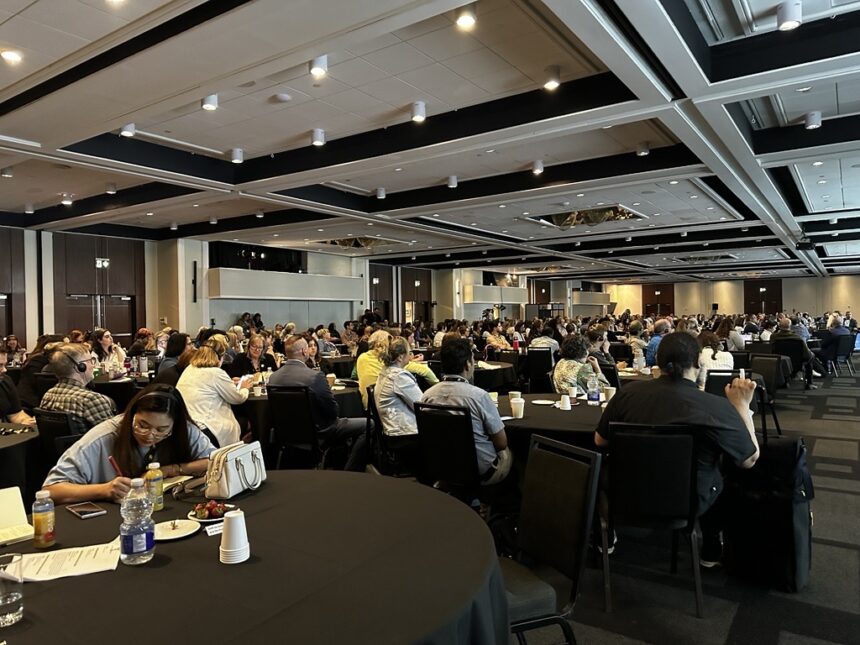The stark reality of food insecurity in Montreal has reached unprecedented levels, with local food banks now serving over 700,000 children monthly across the greater metropolitan area. This troubling statistic took center stage at yesterday’s Montreal Food Insecurity Summit 2024, where I witnessed community leaders, politicians, and advocates gathering at Palais des congrès to address what many are calling a “silent emergency.”
“We’ve never seen numbers like this,” explained Marie-Claude Thibault, executive director of Moisson Montréal, as we discussed the crisis between sessions. “Five years ago, children represented about 30% of those we served. Today, that figure approaches 40%, and the trend shows no signs of reversing.”
The summit, organized by the Montreal Food Security Coalition, brought together over 300 stakeholders to develop actionable strategies for combating hunger in our city. What struck me most was the diversity of attendees – from grassroots community organizers to corporate executives, all unified by urgency.
Mayor Valérie Plante opened the proceedings with a sobering assessment. “Food insecurity touches every borough in our city, though not equally,” she noted. “We must acknowledge that some neighborhoods are facing disproportionate challenges, particularly Montréal-Nord, Parc-Extension, and parts of Hochelaga-Maisonneuve.”
Data presented by the Montreal Public Health Department revealed that approximately 15.3% of Montreal households currently experience some form of food insecurity – a figure that has climbed steadily since 2019. Dr. Mylene Drouin, Montreal’s Public Health Director, emphasized how this crisis affects more than just hunger.
“Food insecurity is directly linked to poorer health outcomes, increased healthcare costs, and diminished educational achievement,” Dr. Drouin explained. “When children don’t have reliable access to nutritious food, the effects cascade through every aspect of their development.”
The summit featured a particularly moving panel of community members who shared personal experiences with food insecurity. Fatima Bensouda, a single mother from Côte-des-Neiges, described how inflation has transformed her relationship with food.
“Before, grocery shopping was routine. Now, it’s mathematical – calculating every dollar, deciding which meals to skip,” Bensouda shared. “My children notice when I’m not eating with them. This is the reality many parents face.”
Solutions proposed during the summit ranged from immediate interventions to long-term systemic changes. Jean-François Archambault, founder of La Tablée des Chefs, presented their expanded food recovery program, which now redirects surplus food from restaurants and hotels to community organizations.
“Last year alone, we recovered enough food for over 2 million meals across Quebec, with nearly half distributed in Montreal,” Archambault noted. “But recovery alone isn’t enough – we need to address the root causes.”
Indeed, discussions frequently returned to underlying factors: housing affordability, minimum wage adequacy, and the impact of inflation on food prices. Statistics Canada data presented showed that food prices in Montreal have increased approximately 23% since 2019, while average wages have risen only about 13% during the same period.
The Quebec government, represented by Minister of Social Solidarity Chantal Rouleau, announced a $15 million emergency funding package to support food security initiatives across the province. However, community organizations expressed concern that this represents merely a temporary bandage on a worsening wound.
“Emergency food assistance was never designed to be a permanent solution,” remarked Pierre Morissette, director of AQDR-Montréal (Association québécoise de défense des droits des personnes retraitées et préretraitées). “Yet we’re seeing seniors who have relied on food banks for years now, with no path toward self-sufficiency.”
The summit concluded with the announcement of a new collaborative initiative: the Montreal Food Security Action Network, which will coordinate efforts between government agencies, private sector partners, and community organizations to implement a five-year strategy addressing hunger in our city.
Walking through Jean-Talon Market this morning, I couldn’t help but view the abundance differently – the colorful produce, artisanal cheeses, and freshly baked bread standing in stark contrast to yesterday’s discussions. For too many Montrealers, these everyday pleasures remain inaccessible luxuries.
As someone who has covered Montreal’s cultural and social landscape for years, I’ve observed how food insecurity often remains hidden behind closed doors, a private struggle many families endure silently. The summit succeeded in bringing these experiences into the light, challenging all of us to recognize hunger not as an individual failure but as a collective responsibility.
The true measure of this summit’s success will ultimately be whether the concerning statistics presented yesterday begin to trend in the opposite direction. For the 700,000 children currently relying on food assistance across our region, that change cannot come soon enough.







